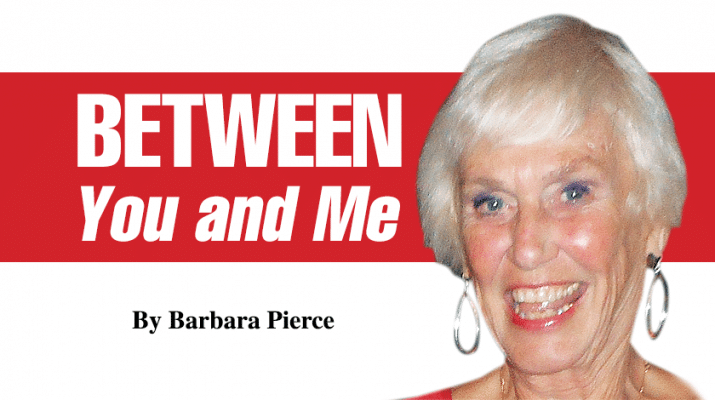While misdiagnosed, experience still teaches columnist the terror dementia brings
By Barbara Pierce
My primary physician looked me straight in the eye. “I don’t know how else to put it to you. You have dementia. I’m so sorry.”
“What? Me demented?” ran through my mind. I could live with the fact that my memory was really bad lately. I could live with making notes to remind me of every little thing I was supposed to do, then never remembering where I put the notes. But I wasn’t ready to hear it labeled with those devastating words. No, I couldn’t live with dementia.
“Isn’t there some way to know for sure?” I pleaded. “Isn’t there some way to slow it down?”
“No,” he said. “It can only be diagnosed in an autopsy, and it can’t be slowed down.”
I knew dementia. I’d worked with victims — vivid pictures in my mind. The dignified looking former professor of English who sat relaxed with his legs crossed as his wife and I talked. We all stood up. He tried to walk, but couldn’t. “You need to uncross your legs before you walk,” gently reminded his wife.
And the daughter, sitting next to her mother, devastated when I asked her mother, “Who’s that with you?” A look of total puzzlement crossed mother’s face. “I don’t know who she is or why she’s sitting here,” she said.
That couldn’t be me. Oh no. Never! He’s a family physician, not a specialist. Maybe he’s wrong. I need to hear it from a specialist. I’m getting another opinion.
A psychiatrist who specialized in diagnosing and treating dementia referred me for several tests and scheduled me to return for results in three weeks.
During those weeks, my memory continued to get worse. And my brain was failing in scary ways. As a writer, words are my stock in trade. I deal in words. I lost words and I lost letters. I’d interview people for my newspaper stories and ask them to spell their name. Then I couldn’t comprehend the letters as they spelled it out; I got stuck. I’d go to the library to find books stacked alphabetically. I couldn’t remember the alphabet well enough to find the books.
I’d take Savannah, our golden retriever, for a walk, walk back in through the door and realize I’d left her along the way. My husband got mad every time I went to the supermarket and failed to get him his exact Nature’s Own butter, bread or whatever it was he wanted. I know he doesn’t have patience to be a caregiver. He’d be in hell. So would I, but I wouldn’t know it.
Paralyzing fear
So very scary. How do I go on, knowing that I might be sinking into nothingness?
Just get through one day at a time, I kept telling myself. You don’t have a definite diagnosis yet. Don’t think ahead; don’t think about what it would mean if he were right. But it was hard not to do that.
Spending time with my grandchildren was always the best part of my life. Would I look at this beautiful little boy and girl and wonder who they were and why they were here?
Would I wander through the supermarket produce department and forget Fuji apples were my favorites? Would I even forget what an apple is for?
I knew I had several risks for dementia. One being a woman — women are twice as likely to get dementia as men. Every woman knows that after you reach menopause, your skin gets dry, your hair gets dry, you start to show aging. Same thing happens in the brain.
The happiest day of my life (as a person with some age on her anyway) came when I saw the psychiatrist to hear the results of the tests. “You have pseudo-dementia,” he explained. “Caused by the anti-depressant you’ve been taking. Medications that work on the brain in one way, like anti-depressants, can sometimes cause other changes in the brain. Your brain will be fine once the medication gets out of your system.”
That was about 10 years ago, and I’m blessed to report that my brain and I are still going strong. I did find that other medications I took, painkillers like Neurontin or Lyrica, also interfered with my memory.
My caution is this: If you’ve having memory problems, first carefully look at the medications you’re taking.
What I gained from this experience was an understanding of what it must feel like to know your brain is slipping away, eroding out from under you, and you can’t do a thing to stop it.
I hope I’ve gained more empathy for those going down that terrifying road. I pray for each of them and their loved ones.
• Barbara Pierce is a retired licensed clinical social worker with many years of experience helping people. If you would like to purchase a copy of her book, “When You Come to the Edge: Aging” or if you have questions for her, contact her at barbarapierce06@yahoo.com.


